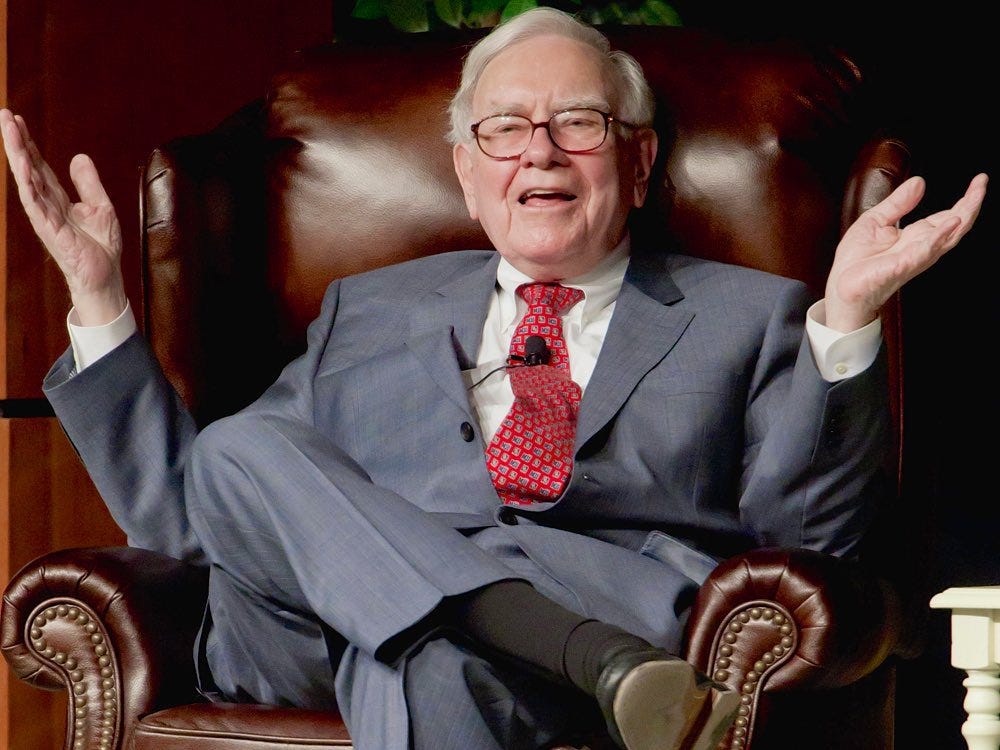Buffett's big lesson after 80 years of investing.
The power of a few good decisions during a lifetime.
Warren Buffett has published his annual letter to Berkshire Hathaway shareholders.
He’s been offering up investment lessons in his letters for more than six decades.
You’ve probably heard the line, “be greedy when others are fearful.”
That one was shared, back in 1986.
This time, Buffett, who is 92, leaned into the power of playing the long game.
“I have been investing for 80 years – more than one-third of our country’s lifetime,” Buffett noted.
One of his biggest lessons learned?
“Over time, it takes just a few winners to work wonders.”
The Sobering Realities of Baseball
Buffett’s comments made me think of baseball, a sport he has loved since he was a kid.
Hall of famers with the highest batting averages include the likes of Ty Cobb, Ted Williams, Babe Ruth, Lou Gehrig, Tony Gwynn, Stan Musial and Rod Carew.
They are considered some of the game’s best.
And yet, none of them finished with career averages above .400, which is viewed as a nearly unachievable goal.
Buffett, in describing his own choices, says he’s been “no better than so-so” at investing over the years.
Instead, he says Berkshire Hathaway’s results “have been the product of about a dozen truly good decisions – that would be about one every five years.”
Long Term or Bust
Before we dive into some of Buffett’s “good decisions,” we should highlight his investing goal, which he also outlines in the letter.
“Our goal… is to make meaningful investments in businesses with both long-lasting favorable economic characteristics and trustworthy managers.”
Meaning…Buffett is happy to ignore short-term noise.
That includes the quarterly game on Wall Street known as earnings season, which he describes as one of the shames of capitalism.
“Beating “expectations” is heralded as a managerial triumph,” Buffett observes. “That activity is disgusting. It requires no talent to manipulate numbers: Only a deep desire to deceive is required.”
Buffett’s “Good Decisions”
In his letter, Buffett highlights investments that have become some of Berkshire’s biggest equity holdings, such as Coca-Cola.
His business ties to the brand date back to childhood.
At age 7, he was already buying 6-packs of Coke for 25 cents and selling them for a nickel each.
50 years later, he bought his first $1 billion stake in the company.
Today, Berkshire Hathaway is Coca-Cola’s largest investor.
That stake netted Berkshire $704 million worth of Coca-Cola dividends last year.
Similarly, Berkshire is the leading shareholder in companies such as American Express, Bank of America, Chevron, HP Inc., Moody’s, Occidental Petroleum and Paramount Global.
Accepting Creative Destruction
In addressing the fact that not all of his investments have been winners, Buffett cites Austrian economist Joseph Schumpeter, who popularized the term “creative destruction.”
That’s generally the idea that new thinking and new products eventually push out the old.
As Buffett puts it, “capitalism has two sides: the system creates an ever-growing pile of losers, while concurrently delivering a gusher of improved goods and services.”
Creative destruction has been cited as one of the pitfalls of Buffett’s “forever” investing philosophy.
For example, what happens if a big company he controls can’t innovate?
In citing Schumpeter, Buffett seems to view creative destruction as one of the necessary consequences of his strategy.
Some investments will be winners. Some could be losers. But over time, the winners will shine and make the whole portfolio stronger.
Or, as Buffett puts it, “the weeds wither away in significance as the flowers bloom.”
Be Willing To Adjust Your Thinking
As much as Buffett’s messaging aligns with his “buy and hold” approach, he does acknowledge the need to evolve one’s thinking.
He references musings from longtime partner Charlie Munger on what great investors do — namely, “when the world changes, you must change.”
He references Munger’s comments on railroads, a sector they previously disliked.
After recognizing the industry’s importance, Berkshire now controls the largest U.S. railroad by revenue, BNSF.
Buffett also long shied away from tech stocks.
But he became an admirer of the moat around Apple’s ecosystem.
And today, Berkshire is one of Apple’s biggest shareholders.
“Over time, it takes just a few winners to work wonders,” Buffett says. “And, yes, it helps to start early and live into your 90s as well.”




Fantastic read. Thank you.
thanks, good read